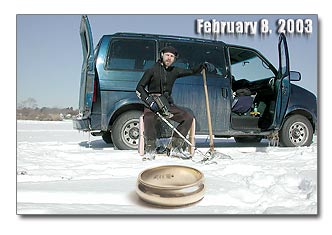Winter Water Hunting
Let me start by saying that succsesful beach hunting is not just about your ability to use your detector or finding a popular beach. A lot of it has to do with timing, or in other words - knowing when it's the best time to hit the beach.
If you're new to water hunting, all this may sound crazy to you and I totally understand. Note that water hunting is a totally different animal from coin shooting in the park, or any land hunting for that matter. Also, fresh water is different too, we're talking salt water beaches with currents waves and crabs!
So, how does this relate to winter water hunting you ask? Remember I mentioned, "timing?" Let me try to explain this in more detail.
 Every beach has a hard bottom such as rocks, coral or clay. Most of the time its covered with several feet of sand. Everything that was lost for the past 200 or so years is sitting down on that hard bottom.
Every beach has a hard bottom such as rocks, coral or clay. Most of the time its covered with several feet of sand. Everything that was lost for the past 200 or so years is sitting down on that hard bottom.
The beach is like the weather - unpredictable! You can't expect to see a nice cut on any beach on a certain date. It is true, in my opinion, that the erosion is likely to happen during the winter-spring period, but there were times I have seen it during the summer months as well (rare).
I have not seen any erosion going on here at my favorite beaches for the past 2 years now.
Its not always a storm, strong winds or tides. It could be calm as it could be, and next thing you know... all the sand is gone, or your producing cut has filled with a ton of sand.
The reason this happens is, a strong current that can move huge amounts of sand real quick and unnoticed.
I was lucky enough to hunt at beaches where the erosion lasted for 6-7 months, and other times only a week or a few days of the year. You just never know. I did notice however that the beach facing the open ocean with heavy surf tends to fill with sand fairly quick, compared to one that is secluded i.e., in a bay or cove.
Remember that I refer to water hunting, dry sand rarely moves, though some of it will get blown away during winter.
The key here is to work as quick as possible to recover as much as you can in the shortest possible time. One never knows how long the "cut" is going to last. Tools like a floating sifter could come in real handy for recovering targets quickly. If the conditions are right, finding your target in a scoop full of rocks and shells could take a lot of your precious time. Remember, that you're limited to the tides and don't have all day.
Of course you can't always use a sifter, if you hunt in waters with surf, but you will quickly find it too impractical. I'm not a big fan of surf, and tend to look for a fairly calm beach.
Most beaches are very empty of people during the winter with an occasional jogger or a dog walker. If you hunt by yourself in the water, now is a good time to invite a friend(s) ; ) You really don't want to be alone out there. If something was to happen, no one would even notice. Safety first! There are plenty of finds for all of you.
I can hear you say, "What about the water temps in the winter?"
Good point! It's freezing to say the least! And that's why you need to know how to dress right before you try it. However, that's a whole new article, and I will try to cover it next.
Remember that I'm not in anyway trying to push you in hunting during winter months. I'm simply sharing the info I have learned thru my experiance. What you do with this info is totally up to you.
I can't say that I enjoy hunting in the winter, actually hate it more then I like it, but the finds make it that much more fun and worthwhile.
